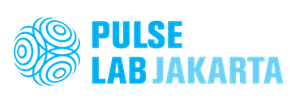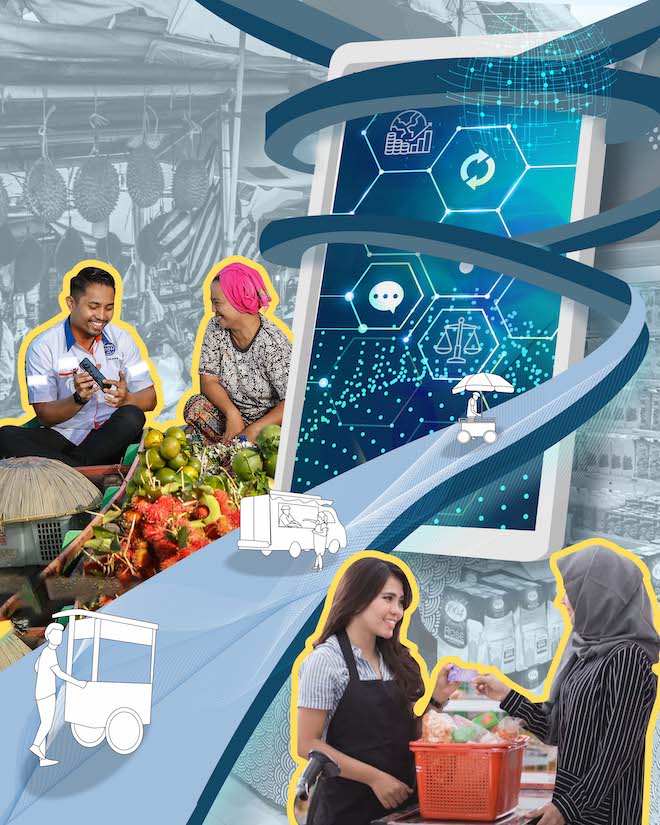
This story is published in collaboration with Pulse Lab Jakarta.
In times of rapid changes and multiple crises—such as the COVID-19 pandemic, the Ukraine conflict, and the climate crisis — responsible governance requires preparation for the unexpected. This also holds true for Indonesia’s Ministry of National Development Planning (Bappenas), which is currently preparing Indonesia’s Long-Term Development Plan (2025–2045). One of the key sectors discussed in this long-term plan involves micro, small, and medium enterprises (MSMEs).
Consisting of more than 64 million enterprises, this sector is often considered the backbone of the Indonesian economy—and a driver of future economic growth. What does the future landscape of MSMEs in Indonesia look like? What are the key emerging issues for this sector? What could potentially alter or disrupt the future? To answer these questions, our UN Global Pulse offices in Indonesia and Finland embarked on a strategic foresight project in collaboration with the Data & Information Center and the Directorate of Cooperatives & SMEs Development within Bappenas: a horizon scan on the future of MSMEs in Indonesia.
Strategic foresight: A new way of working
In March, we kicked off the collaboration with an introductory webinar on strategic foresight, which was attended by more than 50 key policymakers from Bappenas, as well as speakers from UN Global Pulse.
In this seminar, the need to think long term and to move to a more anticipatory approach through strategic foresight was highlighted. This requires foremost that we need to shift our current mindsets and change our ways of working. Common "business as usual" approaches to policymaking often focus on responding to short-term pressures more than anticipating longer-term concerns. While some of the methods used, such as forecasting and predictive data analytics, have at times been useful, they also have their limitations.
For one, these are often based on the assumption that circumstances shaping the world will more or less remain the same, and therefore historical trends will repeat in the future—the COVID-19 crisis has made it clear that is not always the case. Forecasting for instance assumes a linear projection of an expected future, rather than a range of possibilities that can be shaped by the actions taken today. And this is where strategic foresight comes in useful.
Strategic foresight—along with data, digital, innovation, and behavioral science—are a set of cross-cutting strategies, also known as the "quintet of change," proposed in Our Common Agenda. Through Our Common Agenda, the UN is supporting the overall change in the way policies are being developed, helping ensure that strategic foresight is leveraged as an integral part in all policymaking efforts. Strategic foresight helps to navigate in a fundamentally complex and uncertain world, and fosters our ability to envision the future as something we can shape and influence instead of something already decided.
On a day-to-day basis, strategic foresight can help policymakers grasp a more holistic understanding of an issue, such as illustrating how technological, economic, social, environmental, and political drivers (and their interlinkages) might influence the future. These insights can help to both clarify and question assumptions; set policy agendas by identifying emerging issues; as well as explore a range of plausible future scenarios to stress-test policy decisions.
Today, many governments, international organizations, civil society and the private sector are increasingly applying strategic foresight as part of their planning process. For instance, in Singapore, foresights is a key part of the government’s strategic planning process and is incorporated into the annual budget cycle; the Government of Dubai periodically organizes a Museum of the Future event to stimulate thinking of plausible future scenarios in the public and private sectors; and Indonesia’s own State Development Audit Agency (BPK) established a foresights unit in 2021 as a response to growing uncertainties brought on by the COVID-19 pandemic. There are several ways to embed strategic foresight into policymaking, particularly given its range of tools (for example, scenario planning, backcasting, the three horizons and many more). Yet, in whichever case, foresight work needs to start with a solid foundation: horizon scanning.
Horizon scanning: The foundation of strategic foresight
Bappenas and UN Global Pulse established a team of "horizon scanners" to explore potential developments that could affect the future of MSMEs in the coming 5 to 20 years.
Horizon scanning is a process to "scan" emerging trends and signals of change that can shape the future of a particular issue. It is a structured, qualitative evidence-gathering process, which pushes us to look beyond the issues that MSMEs are currently facing.
There are different ways to conduct horizon scanning, we primarily deploy three methods:
- A desk-based manual scan of the relevant sources: websites, recent publications of institutes and organizations, specialized press, and (trusted) social media feeds of relevant experts;
- Interviews with a diverse range of relevant experts and other stakeholders, including youth and people with lived experiences;
- A crowd-based technique that involves focus group discussions to validate the scanning results, reduce biases where possible in our future thinking, and identify potential unseen areas.
At the moment, we are halfway through our horizon scanning process and will share the final report, guidebook, training materials and lessons learned toward the end of the year. In the meantime, we would like to share some reflections on the process from the perspective of a couple horizon scanners on Bappenas’ team.
Mariska Yasrie, associate planner at the Directorate of Cooperatives and MSMEs, said: “Horizon scanning pushes us to think beyond the immediate issues around MSMEs. We are generally more familiar with thematic issues around how to improve MSMEs’ access to finance, market, good quality of human resources, as well as how they might affect MSMEs. However, now we are also thinking in a broader way about how changes in the political, economic, social, technological, environmental and legal landscape can impact the sector. This is critical for long-term planning.”
Ahmad Dading Gunadi, director of Cooperatives and MSME Development at Bappenas, shared that he is particularly impressed by the robustness of horizon scanning. The qualitative process is guided by tools that integrate mechanisms to acknowledge and mitigate our biases as the scanners. For instance, confirmation bias is one of the most well-known and challenging biases in strategic foresight, where we tend to look for what we know and what confirms our beliefs, while ignoring evidence that is in conflict with our beliefs.
"Nobody is an expert on the future, but with such a structured process, strategic foresight allows us to involve more people in imagining and shaping the future."
—Ahmad Dading Gunadi, Director of Cooperatives and MSME Development at Bappenas
In order to mitigate this bias in particular, all the signals identified by the scanners are recorded in a database. This is combined with regular check-in sessions with foresight facilitators from Pulse Lab Finland to discuss the quality and diversity of the signals scanned to date, as well as how to broaden our information sources. In addition, a series of focus group discussions are also intended to serve as validation points based on the signals collected.
We will share the result of the horizon scanning, our process and training materials, as well as more lessons learned from this process soon. Stay tuned.
This article was first published by Medium on 6 July 2022.
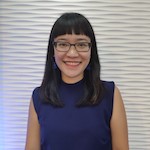 Maesy Angelina
Maesy Angelina
Social Systems Lead, Pulse Lab Jakarta
Maesy Angelina leads a team of social researchers at Pulse Lab Jakarta. She leads the team in harnessing qualitative insights through collaborative design, systems thinking, strategic foresights and behavioral insights to solve problems on issues ranging from safe transport for women, financial inclusion for micro enterprises, bridging digital inequalities, to the adoption of data and tech solutions for better policy making.
 Desi Vicianna
Desi Vicianna
Government Partners Coordinator, Pulse Lab Jakarta
Desi Vicianna is a development enthusiast with more than 10 years experience working on democracy and governance issues, particularly on public sector reforms, open government, civic engagement, transparency and accountability. She has an MA in public policy from the Australian National University and a BA in international relations from the Parahyangan Catholic University.
 Minke Meijnders
Minke Meijnders
Strategic Foresight Specialist, Pulse Lab Finland
Based in Helsinki, Minke Meijnders works as a strategic foresight specialist at Pulse Lab Finland. While working at the University of Ottawa as an instructor, she developed a course on strategic foresight and national security for professionals in the security domain. It touched on how to use foresight tools, such as scenarios and horizon scanning in the context of national security analysis.
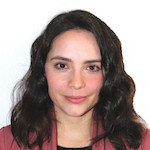 Mariú Abritta Moro
Mariú Abritta Moro
Former Strategic Foresight Analyst, Pulse Lab Finland
Mariú Abritta Moro specialized in environmental technologies and policies, with focus on climate change adaptation and mitigation technologies.
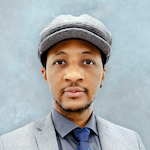 Dwayne Carruthers
Dwayne Carruthers
Former Communication Manager
Pulse Lab Jakarta
Dwayne Carruthers works as the public advocacy manager at UN Global Pulse through Pulse Lab Jakarta, advocating for the adoption and responsible use of data and AI for evidence-based decision-making in the public sector. He is concurrently the global communications lead of the Global South AI4COVID programme. His work has focused on exploring the intersection between people and technology, and pulls from his background in journalism, international law, and diplomacy.